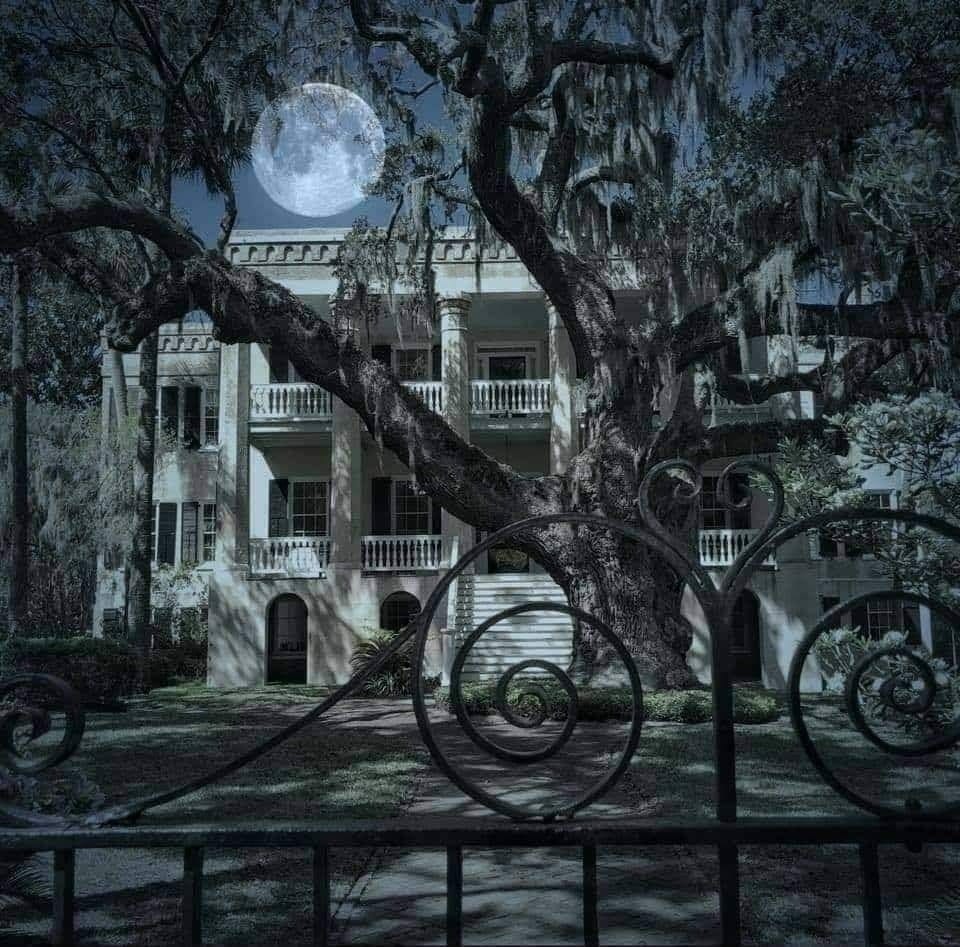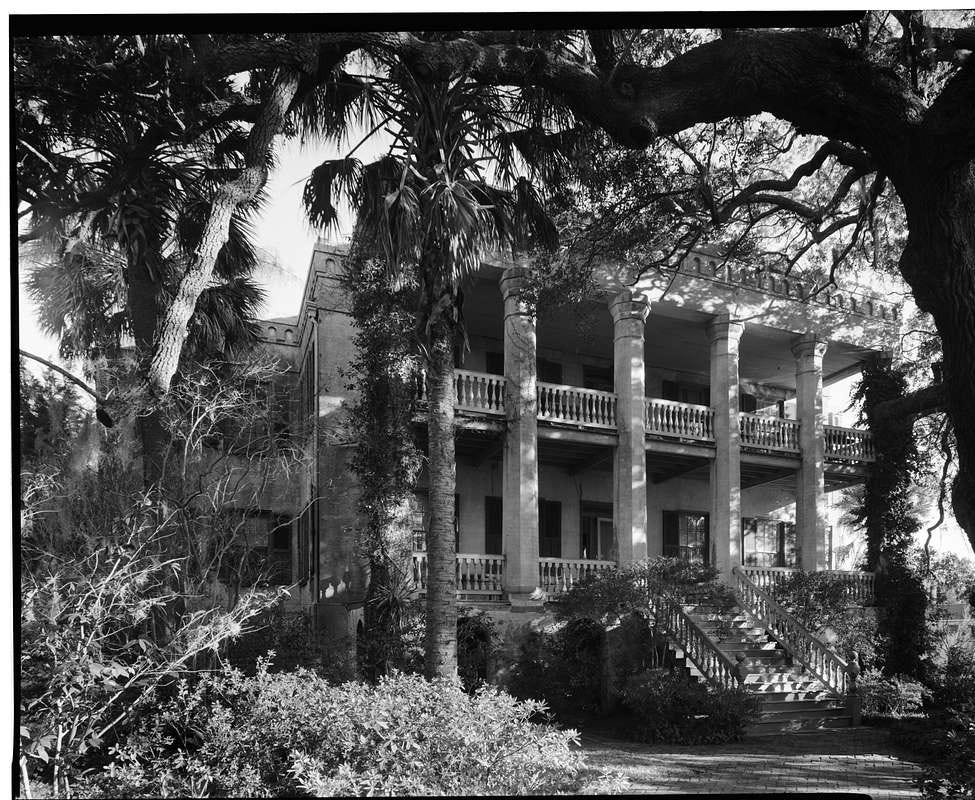The Castle on the River
Haunting whispers of things hidden deep within the Lowcountry.
We were invited to a cocktail party at The Castle one summer evening — that towering Italianate mansion that sat like a stone sentry on the Beaufort riverfront, its wide verandas like arms welcoming the evening. Its stucco walls caught the last of the golden light through the live oaks out front.
By then, whispers of Operation Jackpot had already begun curling through the back rooms of law offices and across bar stools at the Anchorage Inn. We knew more than most, and that made everything — especially that night — feel sharper around the edges.
The house was owned at the time by a flamboyant art dealer from Charleston, someone my husband Cloide didn’t trust, and whose collection of surrealist paintings seemed to leer from the walls. He'd bought the property from one of the old families, though rumor had it the money behind the deal came from a man with ties to Ft. Lauderdale— a name we’d heard more than once in sealed affidavits and late-night meetings concerning crime hidden deep within Beaufort County.
We attended out of caution, more than curiosity, and made sure Dennis was notified. I wore a cream silk dress with mother’s pearls, trying not to sink my heels into the stone walkway as we made our way in.
Inside, the house was all shadows and grandeur — heavy crystal chandeliers, wide staircases, fireplaces tall enough to stand in. And despite the crowd of people laughing, sipping gin fizzes, and gossiping about whose shrimp boat had capsized last week, there was a heaviness in the air I couldn’t shake.
The party was loud, attended by Beaufort’s elite with their polished charm, but beneath it ran something else — something strangely lurking just below the surface. In a far room off the main parlor, I noticed a pair of men speaking quietly, almost too close. Cloide saw them too. One wore a white dinner jacket, crisp and careless. The other I recognized from waiting on a plane at the Frogmore airstrip. Atlanta plates. A man you didn’t expect to see at a historical society fundraiser. They disappeared up the stairwell just as Dennis arrived, nodding subtly to Cloide before drifting off into the crowd, his FBI credentials hidden beneath his tan linen sport coat.
I excused myself and wandered into the study — one of those grand Lowcountry rooms with ceilings so high your voice barely returns to you. That’s where I met her — the woman with silver hair and the voice like worn silk. She stood near the hearth, her drink untouched.
“You know about the little man, don’t you? The French dwarf,” she said, not even glancing at me. “Buried in the walls. He never left. I lived in this house when I was a girl, before my father lost everything. We used to hear him in the hallway.”
“I’ve heard stories.”
“He doesn't like deals being made in his house,” she said flatly. “Not since they walled him in. We used to hear him thumping when men came to talk business here. Especially when it was dirty business.”
She turned, and her face was oddly pale in the lamplight. “You’d be surprised how many smugglers love a haunted house. Makes for a good hiding place — until it doesn’t.”
Then she was gone. Vanished. I turned in a full circle, saw no door open, no footsteps on the stairs—only the faint scent of gardenias, and something… burnt.
An hour later, we heard a crash upstairs. One of the men — the one with the Ft. Lauderdale ties—had fallen on the stairs. Or so they said. But the look on his face was sheer panic. He fled the house long before midnight, his car tires screeching across the gravel. The deal, as we later learned, never closed. That particular shipment never made it ashore.
Dennis would later say someone had spooked him — possibly Cloide, possibly a well-placed whisper, “the FBI is in the parlor.”
But I’ve always wondered.
Maybe it was the little man in the wall—the one who didn’t like shabby business.
The Castle has stood for over a century, its columns proud and bones heavy with memory. But if you ask anyone who’s lived here long enough, they’ll tell you — houses remember. And this one doesn’t forget.
Who were the Gentlemen Smugglers of the late 70s and 80s?
They called them the Gentlemen Smugglers—not because they were harmless, but because they wore their crimes with cufflinks and cologne.
In their offshore activities, these individuals relied not on brute force or cartel tactics but on stealth, social privilege, and the strategic use of their class and connections to avoid scrutiny. They were educated, well-mannered, typically non-violent, and deeply embedded in polite society, participating in real estate, golf, yacht clubs, and various civic groups.
Unlike the violent cartels that would rise later, these men came from old Southern families, prep schools, and college fraternities. They quoted Hemingway, drank bourbon, and drove Mercedes down oyster-shell roads. They played tennis at the club, donated to historic preservation societies, and on Sunday mornings, some even sat in pews beside their mothers.
And yet, by night, they were part of something darker—slick, silent operations that moved tons of marijuana and hashish from the Caribbean into the hidden veins of the Lowcountry coast. They dressed like real estate developers, but they operated like smugglers from another time.
Writing about this place and time, taking me back to days of mystery and crimes long forgotten, will never be easy. I prefer telling you tales of humor, Southern life, our unique culture, history, and adventures. But this story, too, is part of our history and the stories that will follow.
Although the crimes I describe occurred decades ago, little was ever written about the lives that were threatened by the perpetrators. It still hangs like a dark cloud over what was a turbulent chapter in South Carolina's history.
This story is personal - my husband was a land developer, and we owned 6 miles along the intercoastal waterway with many good places where they could secretly offload. Landowners who did not cooperate could easily end up in the bowels of a ship’s hold - or worse.
During this time, developers, homeowners, and plantation owners who owned land along these endless waterways were fair game for the smugglers who would do anything to protect themselves and gain access to places where they could offload in secret. Having an accessible and secluded place to offload was vital to their success.
Our land was surrounded by islands, dense marshlands, and thick vegetation. This undeveloped seclusion was exactly what they were looking for. Cramer’s Island at the far end of our property was perfect. They offered us millions with the only stipulation being that we must be far away during their offloading operation. They even gave us tickets to the Bahamas. We denied all offers and were left at the mercy of a bunch of lawless scoundrels. It was impossible to discern who in town might be involved. Many sleepless nights followed - I held my loved ones tighter, not knowing what the next day would bring.




Truly fascinating ... leaves the reader wanting to know more. You never know what kinds of lives those around us are really living.